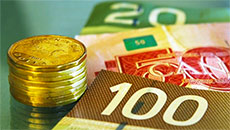WATERLOO, Ont. — If BlackBerry's latest Priv smartphones are flying off shelves, the company isn't boasting about it.
With about a month of sales for the new device under its belt, BlackBerry was vague Friday about how its first Android smartphone has performed so far in the marketplace.
"Numbers will tell us but the initial 30 days, so to speak, has been quite positive, and I don't want to over hype that situation," chief executive John Chen told analysts Friday as BlackBerry delivered better-than-expected financial results.
Chen decided not to provide specific Priv sales figures, emphasizing that its availability will spike to 31 countries by the end of February when the company's fourth-quarter ends, from the initial four countries in the third quarter ended Nov. 28.
The lack of detail prevents investors from getting a clear picture of how many people bought the phone shortly after its launch. However, BlackBerry did provide some information by releasing its usual tally for all device sales, including the Passport and other older models that use the company's own operating system.
About 700,000 devices were sold, which is a steep decline from 1.9 million at the same time last year and also down from 800,000 in the second quarter of this year. But the average sales price jumped to $315 from $240, suggesting a large quantity of sales came from more expensive Priv phones.
BlackBerry (TSX:BB) (Nasdaq:BBRY) shares were nearly nine per cent higher in early Friday trading on the TSX as investors digested the latest financial report, which showed revenue came in above expectations and its loss was far less than anticipated.
The company's net loss was US$89 million or 17 cents per share under standard accounting rules.
After adjustments, BlackBerry lost US$15 million or three cents per share — far less than analyst expectations of a loss of 14 cents per share, according to Thomson Reuters.
Revenue was US$557 million, a slight improvement from $548 million a year ago and about $64 million more than analyst predictions.
Within its divisions, the shift away from an emphasis on phone sales continued.
Software and services revenue more than doubled to $154 million from $57 million a year ago, driven by the recent acquisition of Good Technology Corp.

Hardware revenues, which account for device sales, dropped to $214 million from $361 million a year ago.
BlackBerry has been relying on the Priv as the golden ticket to make its hardware business profitable again.
"Depending on how Priv does ... there is a chance we could achieve or get closer to breakeven operating profitability for our overall device business in the (fourth) quarter," Chen said.
He also told analysts he expects the company's fourth-quarter results to outdo their current expectations, which predict an adjusted loss of 11 cents per share.
BlackBerry, a pioneer of smartphone industry and the former market leader, lost that position years ago as competitors like Apple's iPhone and Samsung's Galaxy attracted the majority of its longtime users.
The Priv is BlackBerry's most aggressive attempt to bring some of those customers back. Reviews for the device have been mixed to positive and the company has been criticized for pricing the phone well above other Android devices on the market.
When BlackBerry's competitors introduce new devices next year the company will likely have to reduce the price of the Priv to be competitive, Chen said.
"We obviously won't fool ourselves to expect we'll continue to maintain the high prices that we could get today," he said.
In early trading, BlackBerry shares were ahead 98 cents to C$11.87 on the Toronto Stock Exchange.





